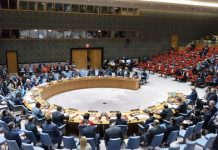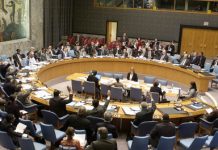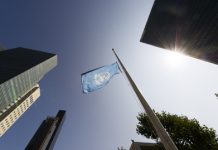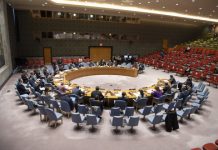Myanmar is spiralling, warns UN chief in peace call to ASEAN nations
As hostilities in Myanmar sparked by a 2021 military coup plunge millions into a deepening humanitarian crisis, UN Secretary-General António Guterres has urged the country’s neighbours “to leverage their influence” to bring about peace.
The UN chief’s appeal – on Friday – comes as aid agencies warned of massive and acute needs across Myanmar.
Communities have been particularly hard hit in the north, southeast and Rakhine State and their plight has been made even worse by torrential rainfall and catastrophic flooding, amid a lack of humanitarian access and insufficient relief funding.
According to the UN aid coordination office, OCHA, more than three million people are displaced across Myanmar, predominantly after fleeing “widespread” conflict.
Since early September, one million people have also been affected by torrential monsoon rains and the aftermath of Typhoon Yagi. At least 360 people died in the floods and many more have been injured across multiple regions, according to reports.
With more, here’s OCHA spokesperson Jens Laerke:
“Immediate response priorities include ensuring access to clean water, sanitation and hygiene services to prevent disease outbreaks, as well as food and health assistance. Reconstruction efforts are critical to restore safe housing for families whose homes have been destroyed, and to allow children to return to schools.”
To date, the aid response has provided food to more than 150,000 people in the southeast, northwest and Rakhine state; there are plans to reach an additional 73,000 people in the southeast. Over 80,000 people in the northwest have received water, sanitation and hygiene relief items, along with shelter materials and other non-food items.
Middle East crisis: UN human rights office condemns worsening violence
UN peacekeepers came under fire for the second day in a row in Lebanon on Friday, amid intensifying Israeli bombing of Beirut and southern areas, along with continuing Hezbollah rocket fire into Israel.
In an appeal for an end to the “killing, destruction [and] bellicose posturing” by those in power, the UN human rights office, OHCHR, said that the situation for civilians on the ground “in Lebanon, Gaza, Israel and Syria is getting worse by the day”.
According to the UN Interim Force in Lebanon (UNIFIL), two peacekeepers were injured “after two explosions” close to an observation tower on Friday; that came just a day after two more of the Mission’s troops were hurt as an Israeli tank “fired its weapon toward an observation tower”.
In Geneva, UN human rights office spokesperson Ravina Shamdasani shared reports that the densely populated Lebanese capital of Beirut “is increasingly being hit by Israeli airstrikes”.
These strikes and more in the south have left more than 2,100 dead over the last year, according to the Lebanese authorities, while Hezbollah and other armed groups “continue to fire rockets into Israel, resulting in the first civilian fatalities in the north since the most recent escalation of hostilities between Israel and Lebanon last month”, Ms. Shamdasani noted.
She also warned that the situation in Gaza remains desperate, too:
“Over the last week, the Israeli military has intensified operations in north Gaza, further severing the area from the rest of the Gaza Strip and risking afresh the lives of civilians in the areas. Intense strikes, shelling, quadcopter shootings and ground incursions have occurred over the past days, hitting residential buildings and groups of people, causing numerous casualties and once again, mass displacement of Palestinians in the area.”
300 million children a year are victims of online abuse
More than 300 million children a year fall victim to sexual abuse and exploitation online – that’s the worrying finding of a new report by top independent human rights expert Mama Fatima Singhateh.
Ms. Singhateh, Special Rapporteur on the sale, sexual exploitation and sexual abuse of children, announced the alarming statistic on Friday.
She said that children are more exposed to harm than before, thanks to the misuse of existing technology in the digital domain.
Typical examples of abuse include sharing non-consensual images and videos and the creation of content that can be used to sexually extort children, along with livestreamed sexual abuse, the Special Rapporteur explained.
“Emerging technologies such as deepfakes, nudifying, de-aging, artificial intelligence…(and) voice cloning, amplify and extend existing methods to exploit children,” said the expert, who works in an individual capacity and is not a UN staff member.
To combat the growing threat to children, Ms. Singateh highlighted the responsibility of governments, tech companies and social media platforms to make the online space safe for all, in line with the UN-led Global Digital Compact.
Daniel Johnson, UN News
Music composed and produced by Joachim Harris. All rights reserved.
Source of original article: United Nations (news.un.org). Photo credit: UN. The content of this article does not necessarily reflect the views or opinion of Global Diaspora News (www.globaldiasporanews.com).
To submit your press release: (https://www.globaldiasporanews.com/pr).
To advertise on Global Diaspora News: (www.globaldiasporanews.com/ads).
Sign up to Global Diaspora News newsletter (https://www.globaldiasporanews.com/newsletter/) to start receiving updates and opportunities directly in your email inbox for free.

























